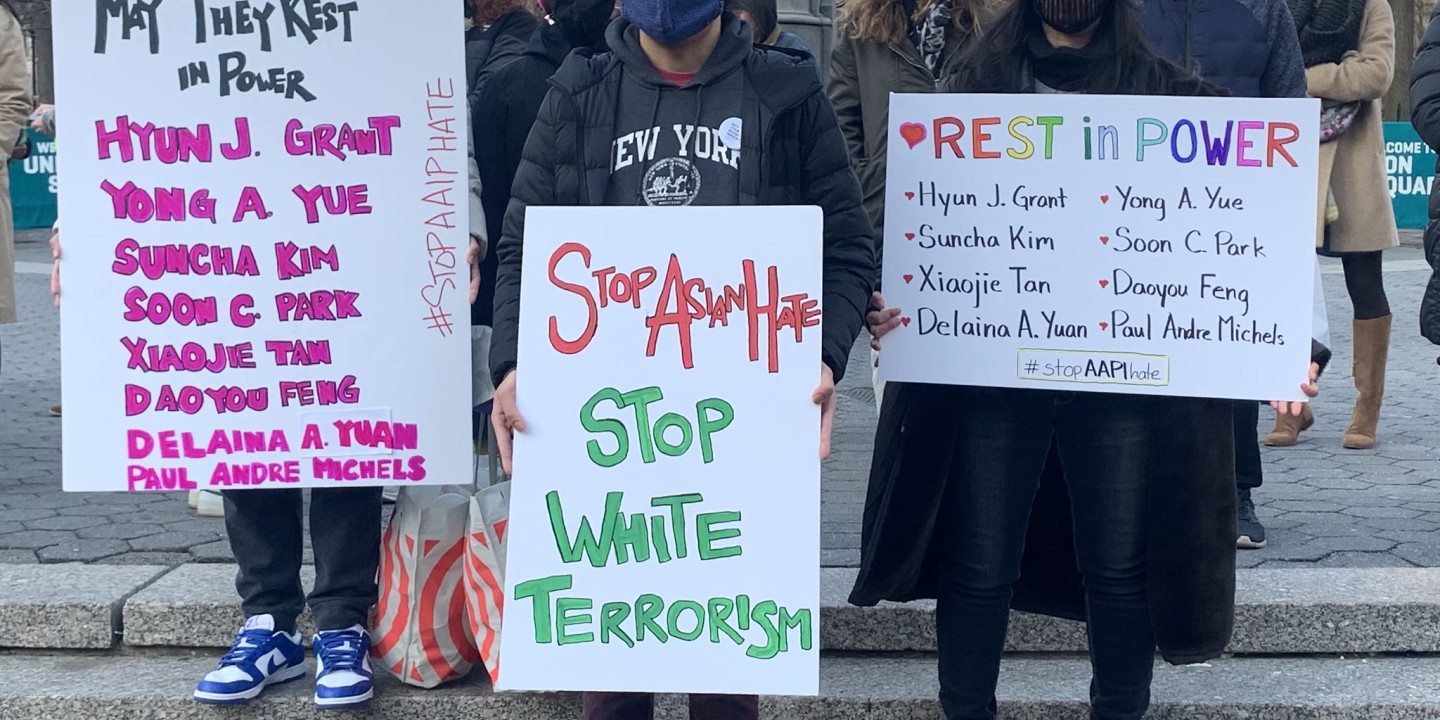How did the Atlanta spa shooter get to that point?
Was there a void where his mind’s eye should have seen the humanity of the eight people, six of them Asian American women, whom he killed?

At 2:37 pm on March 16, 2021, a black SUV pulled into a parking space in front of Young’s Asian Massage in Cherokee County, Georgia. The driver sat inside the vehicle for an hour. Then, at 3:37, the driver exited and began one of the worst massacres to ever afflict Asians in America, particularly Asian women.
I don’t believe in giving mass murderers one iota more attention than is warranted. But as we reflect on how this happened—and in particular, as we view these killings against the backdrop of rising Christian nationalism and its encouragement of anti-Asian animosity—Christians of conscience need to face this question: In that hour, what kind of preaching went through the mind of that minister’s son?
Did the malformed thoughts, impulses, and rationalizations flitting through his psyche highlight the sacred worth of Asian women, let alone of Asian sex workers? Did the spiritual formation culminating in this Southern Baptist’s holy war on a self-described “sexual addiction” force any recognition that the people he intended to kill at Young’s, who might not even have engaged in sex work, bore the divine image? Did any of his biblical literacy result in his glimpsing John the Revelator’s vision of a heavenly multitude “from all tribes and peoples and languages,” including Asian peoples and Asian languages?
Or was there a void where his mind’s eye should have seen the humanity of those he killed—a void breached and widened by sermons that spoke of the Christian life as a “war,” that invoked sex solely to warn congregants to “get rid of anything and everything that would allow you to [sin sexually],” that invoked Asian people solely to lament the “over one billion Hindus” who were, in the preacher’s words, going to “plunge into an eternal hell if they don’t repent”? Was there instead a circuit of apocalyptic images, as sketched by pastor Jerry Dockery’s March 14 sermon about “no one escaping” judgment, a sermon on Revelation in which John’s aforementioned celebration of God’s borderless kingdom warranted no mention at all?
In the place where there might have been an emphasis on loving all of humanity, did the killer hear a deafening silence?
Defensive Christians who listen to the sermons at Crabapple First Baptist may respond that what the killer might have heard on Sundays was, in Sarah Pulliam Bailey’s words, “not uncommon.” Indeed Crabapple’s preachers eschew explicit racism, favoring an emphasis on hellfire, sexual immorality, and the dangers of “radical feminism,” refrains that steep scores of non-homicidal churchgoers in shame. However, what Crabapple’s preachers didn’t say is just as important as what they did. By that, I mean the church’s dearth of substantive resistance to Christian nationalism, an absence rooted in the power dynamics of its denomination.
Christian nationalism is an affective complex of patriotic fervor, pious sentimentality, racist hostility, and patriarchal sexuality. It is supported by an astonishing number of surveyed Americans—almost half. The worldview that trumpets “Blue Lives Matter” and expresses contempt for mask-wearing also makes racist terms like “China Virus” seem more acceptable. Christian nationalist politicians popularized the notion of the coronavirus as “godless Communist” China’s effort to destroy God-fearing Americans. As the Atlantic Council’s Digital Forensics Research Lab established in a 2020 study, such politicians almost single-handedly birthed COVID-era anti-Asian rhetoric, propagating dehumanizing slurs against Chinese people that later translated into violence. Such politicians include three prominent Southern Baptists: Sen. Ted Cruz, Sen. Lindsey Graham, and Rep. Kevin McCarthy, the last of whom doubled down on his use of the term “Chinese coronavirus” in the wake of the Atlanta shooting.
Faced with these politicians’ unrepentant, sanctified Sinophobia, their respective churches—Houston’s First Baptist, Corinth Baptist in Seneca, South Carolina, and Valley Baptist in Bakersfield, California—have responded by keeping quiet. Pastor Gregg Matte of Houston’s First Baptist sat down with Cruz for a fawning interview in July, four months after Cruz implied that the coronavirus originated in Wuhan’s denizens eating bat soup. When the most powerful Southern Baptists incite hatred without any pushback from their churches, a smaller congregation like Crabapple is hardly going to do a sermon series on Asian American theology. And so the killer was in a position to be catechized not only by Sunday sermons, not only by longstanding tropes about Asian women’s sexuality, but also by a more recent torrent of anti-Asian abuse, including in his own city, by his own senator, with the implicit blessing of his own denomination.
This combination of active malice and passive consent helped lead him to 3:37 pm on Tuesday, March 16. What would it take to imagine a world in which the killer who opened fire decided to drive away instead? One small step is to hold accountable the politicians, pastors, and enablers who created the climate in which he ultimately got out of the car.
The author’s open letter on anti-Asian racism and Christian nationalism can be signed here.



